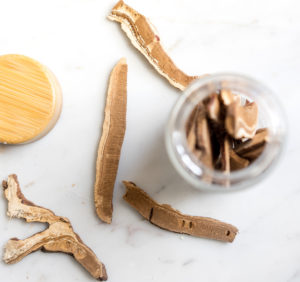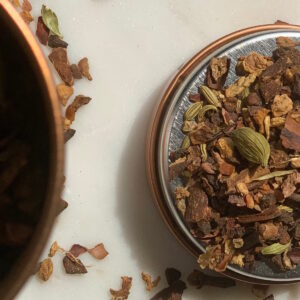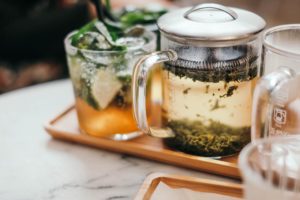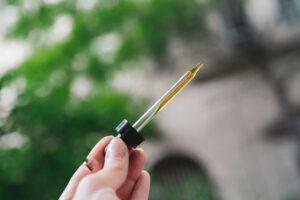PILLS VS. TINCTURES VS. TEAS
Info On Common Herbal Supplement Types

If you’ve ever taken the time to research the health benefits of herbs, you’ve probably read about tinctures, capsules, herbal teas, and even eating herbs raw. While they’re all good for you, it’s difficult to grasp exactly how they differ and why you may prefer one method over another.
To demystify the world of herbs and how they benefit your body, keep reading! We answer all of your questions below.
The Health Benefits Of Herbs

Herbs are rich in protective polyphenols, which help fight and prevent diseases like cancer, heart disease, Alzheimer’s, diabetes and more. Polyphenols are also anti-microbial, which helps protect you from harmful bacteria as well.
But, the studies that show the health benefits of herbs usually use concentrated solutions of the herbs’ active components, so you won’t get the same benefit just by eating raw herbs or steeping a small amount in your tea.
Not to worry — depending on your health needs, there are different ways to consume herbs so that you get the nutrients you want. They are:
- Tinctures: Concentrated herbal extracts made by soaking herbs in alcohol or vinegar, usually consisting of a ratio of one part dried herbs to five parts alcohol. The nature of the alcohol releases the active ingredients in the plant into a liquid form.
- Herbal extracts: Similar to tinctures, herbal extracts use one part herb to five parts glycerin to draw out the active ingredients into a liquid form. The better extracts use heat in their processes
- Dried powder extracts: Herbs are soaked in alcohol, water or chemicals to get the active ingredients and then freeze-dried so the liquid evaporates, leaving a powder behind. This powder is then encapsulated in a pill, capsule, or tablet or served as a granule to make tea..
To clarify, all tinctures, teas and decoctions are extracts, but not all kinds of extracts are tinctures.
You can also steep herbs in tea, which we discuss more below.
Drinking Herbal Tea vs. Herbal Supplements or Extracts
 Here’s what you should know about herbs and tea:
Here’s what you should know about herbs and tea:
- Drinking herbs is more palatable than eating them raw or swallowing them as droplets
- Herbs are more easily absorbed when you drink them
The first point is pretty obvious. You can dilute the flavor of herbs when you steep them in tea and even add other ingredients to make the taste more pleasant as it goes down. For some, drinking herbs is more agreeable than swallowing them as a pill or dropping bitter extract into their mouth.
The second point is a medical fact: Liquid extracts, including herbal teas, have faster absorption rates and are more easily digestible. According to Physician’s Desk Reference, your body absorbs 85 – 90% of nutrients in liquids within 22 to 30 seconds. However, your body only absorbs 10 – 20% of the nutrients contained in a pill.
The main reason you might opt for a tea over an extract, though, is if you want the nutritional benefit of the herb without the alcohol. The amount of alcohol in extracts, could be a trigger for an alcoholic and there may be side effects depending on the type of herb.
Swallowing Herbal Pills vs. Drinking Herbal Teas
 Using the raw herbs in a “tea” is the strongest way to get the whole-herb benefits. There are two main types of “teas” used by herbalists, called infusions or decoctions. Infusions are made like regular tea, with the herb soaked in hot water, but usually in higher concentrations and steeped for longer times. Overnight infusions may be steeped 3-8 hours at a dose of 1 part dried herb to 5 parts water, but most are faster and less concentrated The Chinese use primarily decoctions where herbs are simmered for 20 minutes or so, then strained and consumed. Infusions are generally better for flowers and aromatic leaves and decoctions are better for roots, mushrooms, seeds, and fruits.
Using the raw herbs in a “tea” is the strongest way to get the whole-herb benefits. There are two main types of “teas” used by herbalists, called infusions or decoctions. Infusions are made like regular tea, with the herb soaked in hot water, but usually in higher concentrations and steeped for longer times. Overnight infusions may be steeped 3-8 hours at a dose of 1 part dried herb to 5 parts water, but most are faster and less concentrated The Chinese use primarily decoctions where herbs are simmered for 20 minutes or so, then strained and consumed. Infusions are generally better for flowers and aromatic leaves and decoctions are better for roots, mushrooms, seeds, and fruits.
We just discussed how liquid extracts and teas are easier to digest and absorb. But there’s also a case for taking herbs as a pill or supplement. Take for example sleeping pills, like magnolia bark.
It’s a powerful herb known to reduce insomnia and anxiety. You can buy it as a liquid extract, but it’s more commonly taken as a pill at night to help you sleep. The same goes for valerian root, which also helps you relax and sleep better. Like magnolia bark, it’s also available as a liquid extract.
While tea is both warm and relaxing, it takes time to prepare and drink a full cup, especially before going to bed. This is a case where you might want to take a pill or capsule with water rather than preparing a cup of tea.
The capsule takes time to break down, which gives you a few minutes to get ready for bed as the pill takes effect.
Taking Liquid Extracts vs. a Tea or Pill
 Tinctures and extracts are very concentrated, so you usually only need a dropperful or two for an effective dose (depending on what you’re taking). That said, you take them by dropping them under your tongue. Yes, you won’t get as much of the bitter aftertaste, but this also helps the herbs enter your bloodstream faster than if you drank a diluted cup of tea or took a pill.
Tinctures and extracts are very concentrated, so you usually only need a dropperful or two for an effective dose (depending on what you’re taking). That said, you take them by dropping them under your tongue. Yes, you won’t get as much of the bitter aftertaste, but this also helps the herbs enter your bloodstream faster than if you drank a diluted cup of tea or took a pill.
The only downside here is that if you’re taking several different tinctures or extracts, you’ll want to mix them as a formula first or the combined dosage could be too high.
Eating Raw Herbs vs. Cooking Them
If you’re an experienced cook, you may already add raw herbs to your dishes to add a more vibrant, fresh element to your food. For those of us less gifted in the culinary arts, getting that daily herbal intake can be a challenge. But don’t worry — you can still find ways to add them to your daily diet that won’t require much kitchen skills.
For starters, when it comes to more palatable herbs like parsley or mint, it’s best to grow them yourself as fresh-picked herbs are more nutritious and, well, fresh. You might be thinking, “What’s the problem with buying dried herbs at the store?”
Put simply, you’re getting less of the health benefits. First of all, the ingredients aren’t as fresh; they’re also often irradiated, which is a technique in food production used to kill harmful bacteria and to prolong the shelf life of a product.
Fresh herbs don’t go through irradiation, so they pack more nutrients and taste fresher. Plus, they have a stronger flavor and will prevent you from adding more salt to your food.
If you’re not much of a cook, an easy way to get your daily fix of herbs is to pluck mint (or any other herb you enjoy) and to place it on a sandwich. You can also pick arugula and add it to your pizza, or sprinkle rosemary or oregano on it.
You can keep herbs like dried nettles or sliced astragalus root by your stove and throw them into your soups or pilafs. Just remember to take the astragalus slice out before serving- your teeth will thank you! Powdered mushrooms like cordyceps or lion’s mane can be steeped in coffee, along with powdered ashwaganda. Drink golden milk to get your turmeric dose.
When it comes to fresh herbs, you can’t really go wrong with how you apply them to your food!
Got any more ideas or advice related to herbs? Let us know in the comments!
Newer
Meridian Breakdown 101: What They Are and Why They’re Important
Older
What Your Tongue Says About You
Comments (0)
Leave a reply
You must be logged in to post a comment.




